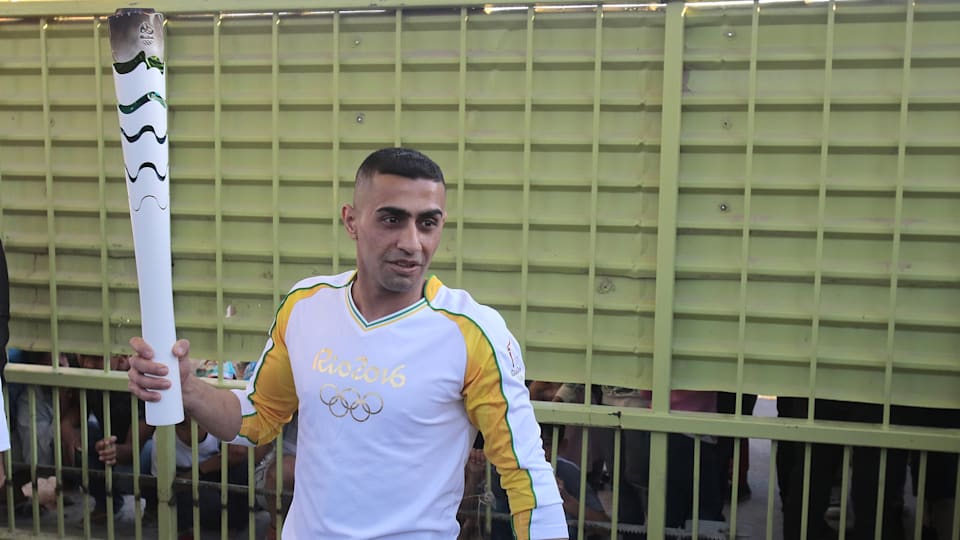Syrian swimmer Ibrahim carried torch for the refugees of the world

Ibrahim Al Hussein, a Syrian refugee-athlete, has carried the Olympic torch through the Eleonas Open Reception Centre in Athens as part of the Rio 2016 Torch Relay. “It is an honour,” he said. “Imagine achieving one of your biggest dreams. Imagine that your dream of more than 20 years is becoming a reality.”
The 27-year-old, who arrived in Greece in 2014 having lost family members in war-torn Syria, received the flame from Hellenic Olympic Committee President Spyros Capralos before running through the Eleonas camp for refugees and migrants in the Greek capital.
This poignant chapter in the torch’s journey demonstrated solidarity with refugees around the world at a time when millions are fleeing war and persecution worldwide. It also represents a victory for the incredible strength of the human spirit.
This day held special significance for Ibrahim, who had his own hopes of competing in the Olympic Games ended after a bomb shattered most of his right leg during the outbreak of war in Syria in 2011.
But after being fitted with a prosthetic leg, the Syrian now trains at a sports complex built for the Olympic Games Athens 2004. An accomplished swimmer in his home country, Al Hussein is now also a member of a wheelchair basketball team. He is actively participating in the sports community of his asylum country, highlighting the role sport can play in demonstrating peace.
It was his father, a swimming coach, who first instilled a love of the water in Ibrahim and all of his 13 siblings. The family lived on the banks of the Euphrates, and the iconic river often served as Ibrahim’s local pool, while the famous Deir ez-Zor suspension bridge was his diving board.
“I used to climb to the top, dive into the water and swim in the river,” recalls Ibrahim. He kept swimming competitively into adulthood, while working full-time as an electrician. Then in 2011 came the war. One day, Ibrahim rushed outside to help a friend who had been severely injured, only to be hit by a bomb. Most of his right leg had to be amputated. The following year he fled to Turkey, where he set about teaching himself to walk again. Now, to get in the pool, Ibrahim has to remove his prosthetic leg and hop to the starting block on his other foot. His swimming coach, Eleni Kokkinou, remembers the day last year when Ibrahim swam again for the first time in five years.
“I was in the pool with him, helping him try to balance his body in the water again,” she recalls. “Without part of his leg, Ibrahim’s flutter-kick, which propels the body forward, was not as strong as it once was. By his second session, however, Ibrahim had regained his confidence in the water.
“I saw a strong athlete, nothing more,” Kokkinou says. “All that’s on his mind is, ‘training, training, training’. His target was to catch up to his personal best time in the 50-metre freestyle.”
Ibrahim Al Hussein now swims the distance in about 28 seconds, less than three seconds short of his best time before losing his leg.
His run through the Athens camp was part of a six-day torch journey around Greece covering 2,235km which began on 21 April with the Rio 2016 flame-lighting ceremony in Olympia. On 27 April, the flame will be officially presented to the organisers of the Olympic Games Rio 2016 at the Panathenaic Stadium, the site of the first modern Olympic Games in Athens, back in 1896.
Al Hussein’s return to the Eleonas camp is even more symbolic after the IOC Executive Board announced in March this year the creation of the Refugee Olympic Athletes (ROA) team to compete at Rio 2016.
An expected ROA Rio team of between 5 and 10 athletes will enjoy the same Olympic experience as the other NOCs, including its own welcoming ceremony at the Rio 2016 Olympic Village, which promotes living in harmony without discrimination. The full composition of the ROA team will be announced early in June.
The Games of the XXXI Olympiad will be held from 5 to 21 August 2016. Approximately 10,500 athletes from more than 200 countries will compete in 28 sports, with a total of 98 medal events.